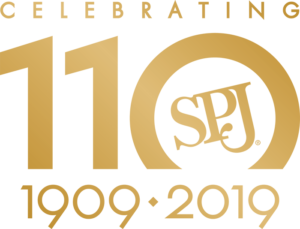College Journalists speaking up for Free Speech
August 25, 2019Society of Professional Journalists
[Founded as Sigma Delta Chi at DePauw University in 1909]
“The real crisis of campus speech lies elsewhere—in the erosion of student newspapers…. Today, these outlets are imperiled by the same economic forces that have hollowed out local newspapers from coast to coast.”
Bureaucrats Put the Squeeze on College Newspapers
The corporatization of higher education has rendered a once-indispensable part of student life irrelevant, right when it’s needed the most.

In this this, Sunday, April 22, 2018 photo, while pushing up against a deadline, students collaborate to put out the upcoming edition of the Washington Square News, New York University’s independent, student-run, newspaper in New York. College journalists are speaking up for themselves in a coordinated campaign to combat some of the same forces that have battered newspapers across the country. More than 100 college newsrooms across the U.S., including the Washington Square News, are using social media campaigns, public awareness events and editorials Wednesday, April 25 to call attention to the important roles they play. (AP Photo/Kathy Willens)
The Atlantic
August 23, 2019
When professional pundits talk about dangers to free expression on campus, they typically refer to a handful of incidents in which colleges have revoked invitations for controversial speakers. This, however, is a fringe issue, confined to a small number of universities. The real crisis of campus speech lies elsewhere—in the erosion of student newspapers. These once-stalwart publications have long served as consistent checks against administrative malfeasance, common forums for campus debate, and training grounds for future professional journalists. Today, these outlets are imperiled by the same economic forces that have hollowed out local newspapers from coast to coast. And unlike their professional peers, student journalists face an added barrier: The kind of bureaucratic interference Liebson met at Stony Brook is becoming the norm for student journalists.
Few school newspapers are financially independent from the institutions they cover, says Chris Evans, president of the College Media Association. As a result, college administrators hold powerful leverage over student journalists and their faculty advisers. The need for aggressive student news organizations is as acute as ever. But image-obsessed administrators are hastening the demise of these once-formidable campus watchdogs.
The AAUP report notes a “growing tendency” for administrations to conduct important business matters “behind closed doors.” Administrators slow-roll student journalists’ requests for public records. At some schools, newspaper advisers have been instructed to conduct “prior review” of student articles before publication, a precaution intended to ensure that anything that could gin up bad publicity never makes it to print.
The decline of college newspapers has taken place against the backdrop of a decades-old power shift in the American university. As the Johns Hopkins University professor Benjamin Ginsberg chronicles in his 2011 book, The Fall of the Faculty, administrative bureaucracies at American universities have grown much faster than the professoriate, a trend that Ginsberg decries.
“University administrators are no different than any other corporate executives or heads of government agencies,” Ginsberg said in an interview. “They’re engaged in constant spin designed to hide any shortcomings that they or their institution might have.”
Deliver us from evil.
“You cannot be a (wo)man of faith unless you know how to doubt. You cannot believe in Gaia unless you are capable of questioning the authority of prejudice, even though that prejudice seems to be religious. Faith is not blind conformity to a prejudice–a ‘pre-judgment.’ It is a decision, a judgment that is fully and deliberately taken in the light of a truth that cannot be proven.”
-Thomas Merton, New Seeds of Contemplation
[G7 in France]
But deliver us from evil, past, present, and to come.
We must strive to overcome evil, but even our best efforts will require Gaia’s help.
The Lord said to Evil, “‘Where did you come from?’ Evil answered, ‘From prowling about on the earthmovers going back and forth on it.” Job 1:7
Cosmology: Part I
The Change of a World View
Fr. Richard Rohr, Center for Action & Contemplation
Today, every academic, professional discipline—psychology, anthropology, history, the various sciences, social studies, art, and business—recognizes change, development, and some kind of evolving phenomenon. But in its search for the Real Absolute, much of Christian theology made one fatal mistake:
It imagined that any notion of God had to be unchanging, an “unmoved mover,” as Aristotelian philosophy called it.
There’s little evidence of a rigid God in the biblical tradition or the image of Trinity—where God is seen as an active verb more than a substantive noun. But many Christians seem to have preferred a stable notion of God as an old white man, sitting on a throne—much like the Greek god Zeus (whose name became the Latin word for God or “Deus”)—a critical and punitive spectator to a creation that was merely a mechanical clock of inevitable laws and punishments, ticking away until Doomsday.
We need a new way of thinking about the universe and our place in it. To begin our two weeks on this theme, I offer a clear and concise description of our changing worldview from Australian theologian Denis Edwards (I waited in a long line once just to thank him for his fine work):
Our theological tradition has been shaped within the worldview of a static universe. The great theological synthesis of St. Thomas Aquinas [1224–1274], for example, was formed within a culture which took for granted that the world was fixed and static, that the Sun and the Moon and the five known planet stars revolved around the Earth in seven celestial spheres, moved by angels, that beyond these seven spheres there were the three heavens, the firmament (the starry heaven), the crystalline heaven, and the empyrean, and that there was a place in the heavenly spheres for paradise. It was assumed that human beings were the center of the universe, that Europe was the center of the world, and that the Earth and its resources were immense and without any obvious limits.
By contrast, we are told today that the universe began with a cosmic explosion called the Big Bang, that we live in an expanding universe, with galaxies rushing away from us at an enormous rate, that the Earth is a relatively small planet revolving around the Sun, that it is hurtling through space as part of a Solar system which is situated toward the edge of the Milky Way galaxy, that we human beings are the product of an evolutionary movement on the Earth, and that we are intimately linked with the health of the delicately balanced life systems on our planet.
The shift between these two mindsets is enormous. It needs to be stressed that most of our tradition has been shaped by the first of these, and even contemporary theology has seldom dealt explicitly with the change to a new mindset. . . .
We have no choice but to face up to the ecological crisis which confronts us. Religious thinkers . . . are searching for a new synthesis of science and faith, a new cosmology, and a “new story.” [1]
[1] Denis Edwards, Jesus and the Cosmos (Paulist Press: 1991), 3-5.
Adapted from Richard Rohr, “Evolution Is Another Name for Growth,” “Evolutionary Thinking,” Oneing, vol. 4, no. 2 (CAC Publishing: 2016), 111-112.
Image credit: Starry Night Over the Rhône (detail), Vincent van Gogh, 1888, Musée d’Orsay, Paris, France.



